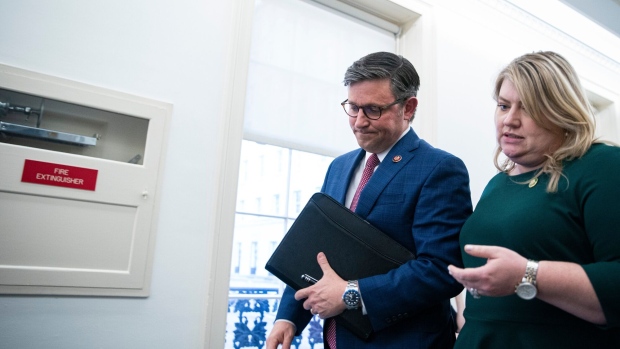Nov 14, 2023
US Shutdown Risk Drops as More Democrats Back GOP Speaker’s Plan
, Bloomberg News

(Bloomberg) -- The odds of a Nov. 18 US government shutdown diminished Tuesday as House Speaker Mike Johnson gained broad Democratic support for his interim funding plan.
Moments before a scheduled House vote, four top House Democratic leaders endorsed Johnson’s proposal, making its passage all but assured. Senate Majority leader Chuck Schumer earlier in the day said he is “heartened, cautiously so,” by the short-term funding proposal.
The House will use an expedited process that requires a two-thirds majority for approval, a threshold that would require support from a large number of Democratic lawmakers.
Schumer said he and his Republican counterpart, Mitch McConnell, “will figure out the best way to get this done quickly” in the Senate, where leaders need the cooperation of all senators to overcome procedural hurdles and meet a late Friday evening deadline to avoid a lapse in federal funding.
Hardline conservatives have made clear that they will vote against the measure because Johnson didn’t satisfy their demands for immediate steep spending cuts or changes to immigration law.
Democrats are dissatisfied because the measure doesn’t include emergency aid for Israel or Ukraine and it threatens a two-step shutdown next year. But party leaders gave hints they will acquiesce anyway because the interim plan continues government funding at current levels.
The White House, which issued a harsh reaction when the bill was first made public Saturday, has since softened its stance, with President Joe Biden declining to issue a veto threat Monday when given the opportunity.
The Johnson bill would fund some parts of the government through Jan. 19 and others through Feb. 2, setting up the possibility of yet another shutdown deadline on Groundhog Day.
“We are not surrendering, we are fighting,” Johnson told reporters Tuesday in the Capitol. “You have to be wise about choosing the fights.”
Johnson touted his plan as way to avoid a massive year-end spending bill that lawmakers have little time to vet.
“We have broken the fever,” he said, adding that his proposal is a “gift” to the American people.
Johnson’s maneuver echoed the strategy his predecessor used to avert a shutdown at the beginning of October but then provoked a successful revolt from dissident conservatives.
Then-speaker Kevin McCarthy also relied on significant Democratic support to pass a similar temporary funding plan, which also stripped of hardliners’ demands. McCarthy even turned to the same expedited process.
The parallels stoked anger among some ultra-conservatives. Representative Chip Roy, a Texas Republican, called Johnson’s move “asinine.”
But after the tumultuous succession fight ignited by McCarthy’s ouster and with Johnson on the job less than three weeks, some conservatives suggested they would allow their new leader a bit of leeway.
Representative Warren Davidson, a member of the hardline Freedom Caucus, said Johnson’s job is secure for now because critics have little appetite to bring him down.
“It’s a little early for that,” the Ohio Republican said. “There’s a lot of support for him personally but it’s a really bad play call “
--With assistance from Mackenzie Hawkins, Allyson Versprille, Maeve Sheehey and Ari Natter.
(Updates with new Schumer comments beginning with fifth paragraph)
©2023 Bloomberg L.P.








